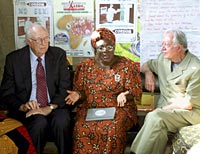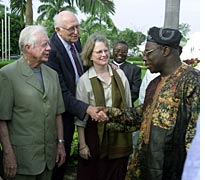Dispatches From Africa
JC: Mabushi, outside Abuja, Nigeria
Early in the day, our delegation drove into the dusty slum community of Mabushi, home to an estimated 6,000 prostitutes, or commercial sex workers (CSWs) as they are known in public health circles. We met with a group of CSWs who have been trained in HIV prevention and are now volunteer "peer educators." Dressed in splendid Nigerian dresses and head ties, these courageous women spoke with us in a dirt-floor building that serves as an HIV-AIDS education and training center by day and a bar by night.
We talked with women like Angela, whose story is sadly typical. In her words, "I was born into a poor family. My parents died when I was very young and help did not come from anywhere. I got married at 15 to a man who beat me. I left him and had nowhere to go. I came into sex work to support myself."
Yet Angela also shared, with a spark of pride, how she is now a "peer educator," teaching other CSWs how to protect themselves, and their clients, from HIV by insisting on condom use. It is an urgent lesson. More than one in three CSWs in Nigeria are HIV positive, but the vast majority do not even realize they are infected. Reaching CSWs and other high-risk groups such as men who are away from their families for long periods of time (truckers, miners, migrant workers) can literally prevent millions of new infections.
Unfortunately, reaching them is very difficult because of the double taboo against AIDS and sex work. These women are the "untouchables," stigmatized throughout African society. And yet in any serious effort to end the epidemic, they are indispensable partners.

The women we met with today are part of a nongovernmental organization known as Women Health, Education and Development (WHED). The heroine of this effort is the organization's founder and executive director, Irene Ogbogu. A nurse by profession, Mrs. Ogbogu has worked extensively as a community health worker in the poor rural areas of northern and eastern Nigeria.
According to Irene, reaching sex workers requires equal parts compassion and public health technique. "One has to learn how to listen. To stoop down low when necessary, to meet them where they are living." Irene and her organization are helping women to leave the sex trade when they can, and—if they can't—teaching them how to protect themselves and others from HIV. The Nigerian Minister of Health A.B.C. Nwosu joined our site visit today and said later that he had never been as shaken as he was by the stories he heard this morning. And on the spot he committed to providing to WHED all the condoms they needed, which these women normally have to pay for.
Most see commercial sex workers as a problem in the spread of the epidemic. The women we met today see themselves as part of the solution. And they are right.

BG: We started our day in Nigeria by meeting with President Olusegun Obasanjo to discuss HIV/AIDS policy. It was almost one year ago, in April of 2001, that the president called African leaders together to grapple with what he called "the greatest impediment to Africa's hope for a bright new century." The Abuja Declaration that resulted remains an important document and an important goal for leaders of all governments.
Later that day, after our extraordinary visit to Mabushi that President Carter describes, we participated in a national summit that President Obasanjo convened with political, health, and religious leaders from across Nigeria to mobilize the country's response to HIV/AIDS. I was honored to be part of such a special occasion.
I told the gathering that we have come to learn from those in Nigeria working on AIDS—and to better understand how we can help make a difference with our giving.
In the course of our trip, I have come to realize two fundamental facts about AIDS. The first is that AIDS is the greatest challenge facing humankind. The numbers themselves prove the point; they are overwhelming, and yet the numbers don't tell the whole story. When we met with commercial sex workers this morning, I couldn't help but ask how many of them had seen a friend or relative die of AIDS, because I have, and it is a slow agony. Anyone who doubts the virulence of AIDS, need only see someone close to him or her die, slowly disintegrating and wasting away.
The other irrefutable fact is that if we are going to defeat HIV/AIDS—country by country, state by state, city by city—it will be because the leadership in those places cared and had the courage and commitment to say "we are not going to give in to this death sentence."
And that is the good news in Nigeria. President Obasanjo, as much as any other leader in Africa or around the globe, has spoken out clearly and made a powerful commitment that bodes well for the future of the country. He is to be congratulated.
But he cannot solve this problem alone. The governors of Nigeria's 36 states must follow in Obasanjo's footsteps, becoming "executive advocates" on the issue, like Gov. Peter Odili, of Rivers State, who has used a million man march and other public gatherings to raise awareness. Strong political leadership at every level is the only way to realize Obasanjo's "hope for a bright new century."